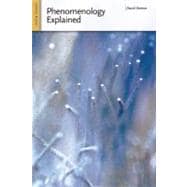Summary
Phenomenology is one of the most important and influential philosophical movements of the last one hundred years. It began in 1900, with the publication of a massive two-volume work, Logical Investigations, by a Czech-German mathematician, Edmund Husserl. It proceeded immediately to exert a strong influence on both philosophy and the social sciences. For example, phenomenology provided the central inspiration for the existentialist movement, as represented by such figures as Martin Heidegger in Germany and Jean-Paul Sartre in France. Subsequent intellectual currents in Europe, when they have not claimed phenomenology as part of their ancestry, have defined themselves in opposition to phenomenology. Thus, to give just one example, the first two works of Jacques Derrida, the father of deconstruction, were devoted to criticisms of Husserl’s phenomenological works.
In the English-speaking world, where “analytic philosophy” dominates, phenomenology has recently emerged as a hot topic after decades of neglect. This has resulted from a dramatic upswing in interest in consciousness, the condition that makes all experience possible. Since the special significance of phenomenology is that it investigates consciousness, analytic philosophers have begun to turn to it as an underutilized resource. For the same reason, Husserl’s work is now widely studied by cognitive scientists.
The current revival of interest in phenomenology also stems from the recognition that not every kind of question can be approached by means of experimental techniques. Not all questions are scientific in that sense. Thus, if there is to be knowledge in logic, mathematics, ethics, political philosophy, aesthetics, epistemology (theory of knowledge), psychology (from the inside), and the study of consciousness, among others, another method is clearly needed. Phenomenology is an attempt to rectify this. Its aim is to focus on the world as given in experience, and to describe it with unprecedented care, rigor, subtlety, and completeness. This applies not only to the objects of sense experience, but to all phenomena: moral, aesthetic, political, mathematical, and so forth. One can avoid the obscure problem of the real, independent existence of the objects of experience in these domains by focusing instead on the objects, as experienced, themselves, along with the acts of consciousness which disclose them.
Phenomenology thus opens up an entirely new field of investigation, never previously explored. Rather than assuming, or trying to discern, what exists outside the realm of the mental, and what causal relations pertain to these extra-mental entities, we can study objects strictly as they are given, that is, as they appear to us in experience.
This book explains what phenomenology is and why it is important. It focuses primarily on the works and ideas of Husserl, but also discusses important later thinkers, giving special emphasis to those whose contributions are most relevant to contemporary concerns. Finally, while Husserl’s greatest contributions were to the philosophical foundations of logic, mathematics, knowledge, and science, this book also addresses extensively the relatively neglected contribution of phenomenology to value theory, especially ethics, political philosophy, and aesthetics.
Author Biography
David Detmer is Professor of Philosophy at Purdue University Calumet. He is the author of Sartre Explained: From Bad Faith to Authenticiy (2008), Challenging Postmodernism: Philosophy and the Politics of Truth (2003), and Freedom as a Value: A Critique of the Ethical Theory of Jean-Paul Sartre (1988). He is a former president of the North American Sartre Society and is currently Executive Editor of Sartre Studies International.


